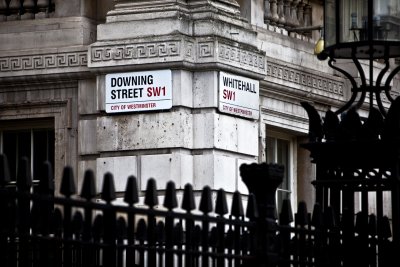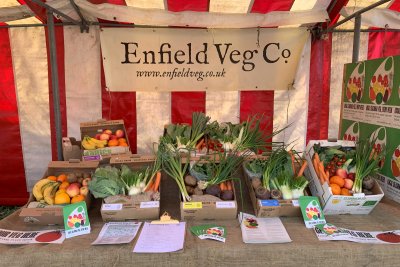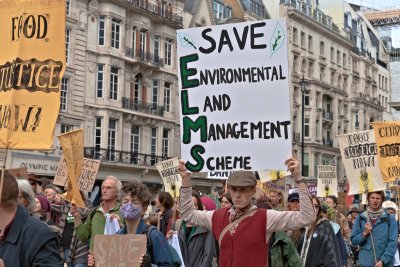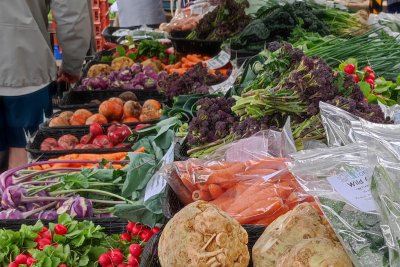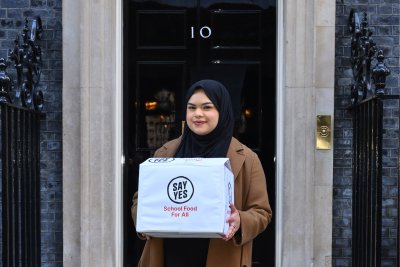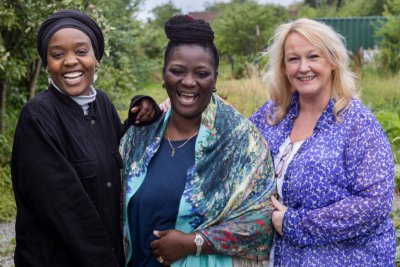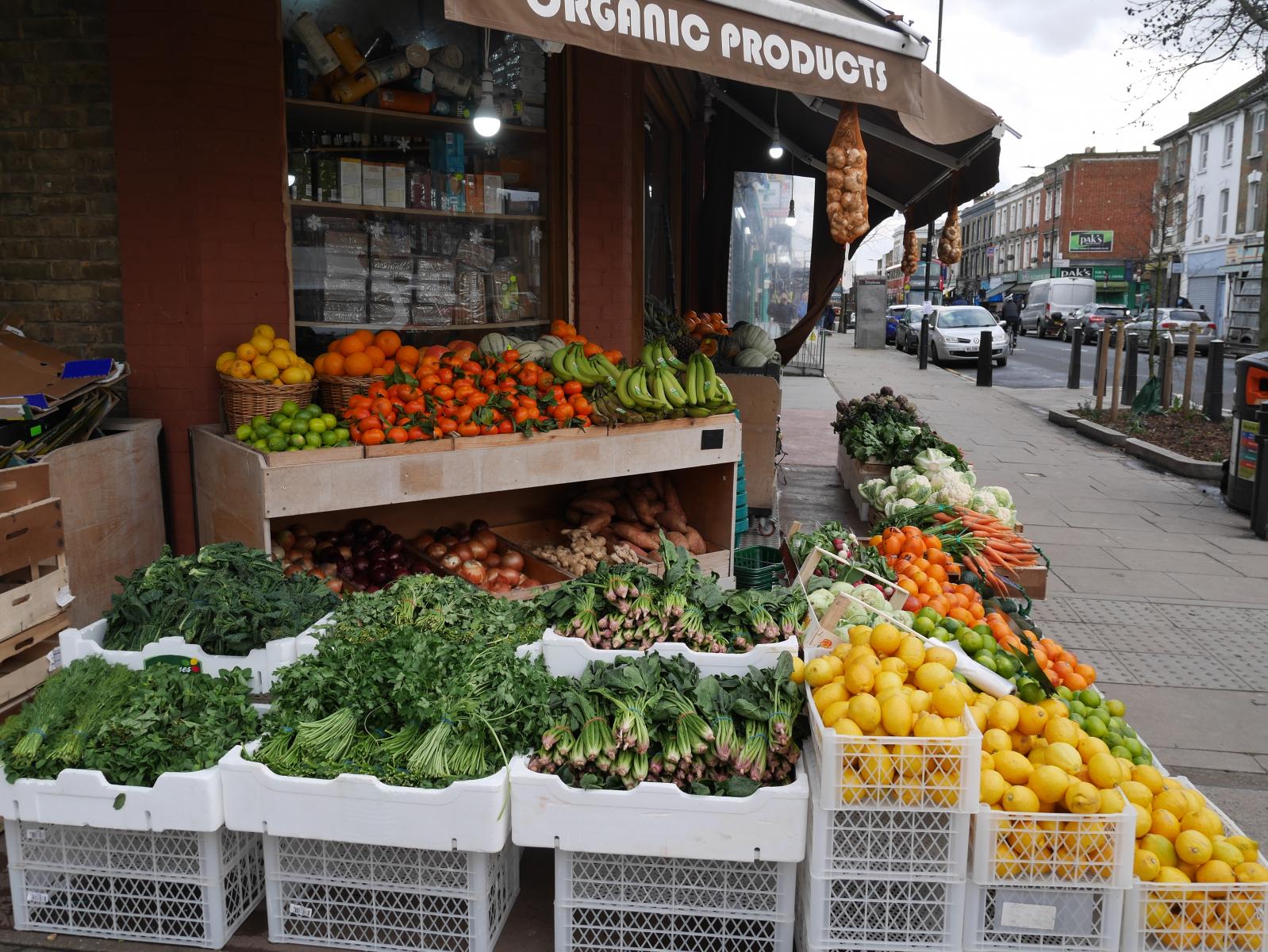
Five ways councils can support the local food economy
What is a good food economy, why should councils care and how do we support it? Ahead of the publication of a new Sustain report, Amy Luck shares stories of how London councils have taken up the challenge to help good food enterprises meet the challenges people face in buying healthy, affordable food.
Over the last year, we have seen the importance and reliance on our local food economy - from the street and farmers markets to the local corner shops - who have supplied, fed and supported communities in a year where food supplies were fraught and food access issues alarmingly apparent. We saw a huge increase in fruit and veg box schemes sales since the pandemic began, with an 111% increase in weekly veg boxes reported in April last year, and a big drive to shop local and support independent stores.
But there has also been a huge rise in food poverty and food bank use showing the clear inequalities across the capital and highlighting the big challenge to ensure everyone can access healthy, affordable and culturally appropriate food where they live.
Sustain’s have long supported good practice among councils working with local enterprises – for example seeing how they are increasing access and uptake of Healthy Start Vouchers through our Food Power and the Veg Cities campaigns. And in 2019 our London team began to explore how to work with independent stores through Good Food Retail initiatives, identified through the London Food strategy. Since then, together with the Greater London Authority, we’ve helped 11 councils to test and trial a number of activities to help people access healthy and affordable food in retail settings.
Building on this we decided to benchmark this area of activity across London, through incorporating council led actions to support the Good Food Economy into Sustain’s annual London Council survey, with Response, Resilience and Recovery: London’s Food Response to Covid-19 report, published last year.
So, what exactly is a Good Food Economy?
Our first step to get councils engaged in this area has been to define what we mean by a good food economy. Firstly the ‘good food’ part – for us this means ‘healthy, fair and sustainable food. And in the context of the local economy this means people having access to a diverse mixture of food enterprises that vary in size and in the types of people who own and run them. These enterprises are providing healthy, affordable food that reduce impact on climate and nature, celebrating local and cultural food choices, and can individually and collectively adapt to change.
And why does this matter to councils?
Well, we know that small and medium enterprise food businesses employ over 16.6 million people in the UK and that social enterprises employ three times more people than mainstream businesses. We also know that street markets can help people on low incomes to access fruit and veg and can be up to 45% cheaper than supermarkets. Plus, in the first Covid-19 lockdown many good food retailers showed remarkable resilience, and one third of those responding to our survey, reported they grew their trade and employed more people. The report covers the benefits of a good food economy, but to summarise a few - supporting good food enterprises and local supply chains can improve public health, help take action on climate and nature, boost jobs, community wealth and the local economy and bring some love back into our high streets.
To show how councils can realise this vision, we have created a checklist of actions that councils and food partnerships can take (and in some cases are already taking).
5 areas where we are seeing real progress
1. Including food retail in council strategies and plans and engaging cross-council teams
By engaging different departments in the council, efforts to increase sales of healthier foods can become a cross-cutting objective; public health or those leading on food can incentivise local businesses to sell healthy food, with backing from colleagues working in economic development or environmental health teams, for example.
2. Developing a Good Food Retail Plan and mapping food access
Access to affordable fruit and vegetables varies massively throughout the capital, and frustratingly, people living in areas of high deprivation can pay more for a basket of healthy food, simultaneously swamped with takeaways and fast-food offers. By mapping access to affordable fruit and veg councils can then target work on things link signing up to Healthy Start vouchers or increasing ranges of healthy food.
One example is The Royal Borough of Greenwich who as part of their Good Food Retail work, helped local convenience stores to sell and promote a ‘healthy basket’ matching the prices of supermarkets and resulting in increase in sales of healthier produce for the store owners.
3. Providing business support and training
Supporting food businesses, stimulating good food start-ups and offering training and apprenticeships, can build local skills and employment in the food sector. Southwark Council has hired a full-time Healthy Food and Business Officer to do exactly that by supporting food SMEs from a business perspective while also encouraging them to sell healthier food. This can also help with inclusive approaches, as in Tower Hamlets where to tackle declining occupancy rate in their local street markets, the High Streets & Town Centres Team worked with 30 women from Black, Asian and minority ethnic backgrounds to set up successful market stalls.
4. Helping food SMEs and markets work with shorter supply chains
Supporting suitable infrastructure and providing access to land, buildings, workspace at reduced rent can allow start-ups and diverse food outlets like farmers markets, production kitchens and local food hubs to flourish. By supporting localised and shorter supply chains to farmers and low-impact fishers, money can be better retained in local economies, support employment and reduce the climate and nature impact of food. Kingston council has partnered with local VCS organisations as part of the new Good Food Co-op and provides local, spray-free and ethically sourced produce in weekly veg boxes to residents.
5. Using public procurement as a tool
Councils have significant buying power which can be used to build community wealth and support independent businesses. By prioritising local purchasing of food this can, in turn, support local jobs and livelihoods, and by ensuring these are using sustainable production methods or are via short supply chains, also provides climate and nature gains. Procuring school fruit and veg from local farms, using local caterers, food suppliers, social enterprises and other good food SMEs for healthy and sustainable food contracts for events and facilities (also discussed in this recent blog on council procurement of meat) are just some ideas.
Read our full list of ways council can support the Good Food Economy in the full report launched at our webinar next week.
With the fallout from Covid-19 and ongoing lockdowns impacting our health, employment rates, closing businesses and high streets and widening inequalities, not to mention the ongoing climate and nature emergency and the impact of Brexit and trade deals on the farming community – we can see that many areas of our local economy need a boost. The good news is that the rise in community food activism, a demand for real good food, growth in healthier options and a surge to support local businesses all provide great opportunities for local authorities.
Now is the time for councils to seize a vision for good food economy – one that supports food enterprises, retailers and markets to sell good food, to meet public health goals, boost employment opportunities and create greener jobs. Better yet, procuring good food from sustainable farmers and shorter supply chains can go some way to tackle our climate and nature emergency. Importantly, this can bring everyone behind a common goal to improve access to good food – no matter where people live or what they earn, so everyone in London and beyond can buy healthy, affordable food.
Find out more about this work and our new report, with recommendations for councils, food partnerships, funders and national government, at our webinar Tuesday 9 March 11am: How councils can support a Good Food Economy: retailer engagement in London and Scotland
If you are a council or food partnerships looking to address food issues through work with your local food economy and food enterprises, we are keen to hear from you. Contact londonfoodlink@sustainweb.org
London Food Link: London Food Link brings together community food enterprises and projects that are working to make good food accessible to everyone in London to help create a healthy, sustainable and ethical food system for all.
Sustain
The Green House
244-254 Cambridge Heath Road
London E2 9DA
020 3559 6777
sustain@sustainweb.org
Sustain advocates food and agriculture policies and practices that enhance the health and welfare of people and animals, improve the working and living environment, promote equity and enrich society and culture.
© Sustain 2024
Registered charity (no. 1018643)
Data privacy & cookies
Icons by Icons8
